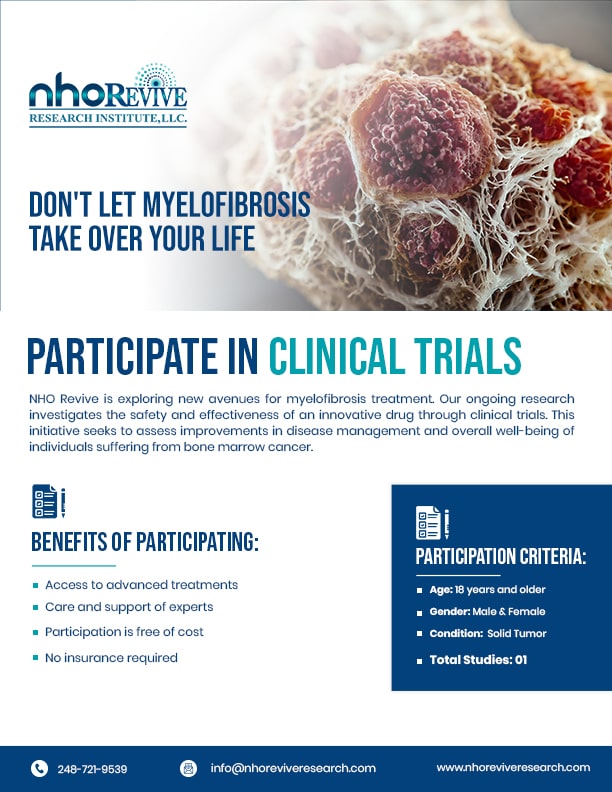NHO Revie is conducting clinical trial for Myelofibrosis to improve the patient outcome for potential treatment for bone marrow cancer.
Myelofibrosis Clinical Trials in Nebraska
Understanding a Rare Bone Marrow Cancer
Learn about Potential Treatment for Myelofibrosis
Myelofibrosis is a rare bone marrow cancer that disrupts the body’s normal blood cell production. The prevalence of MF ranges from 1 to 9 in every 100,000 people.
This condition leads to significant scarring in the bone marrow, causing severe anemia, which can result in weakness and fatigue. The scarring also reduces the number of blood-clotting cells called platelets, increasing the risk of bleeding. Additionally, myelofibrosis symptoms often lead to an enlarged spleen. It can occur independently (primary myelofibrosis) or develop from another bone marrow disorder (secondary myelofibrosis).
NHO Revive’s myelofibrosis clinical trial in Nebraska is dedicated to investigating the safety and efficacy of an investigational drug with a higher potential for effectively targeting cancer. Our commitment is to bring innovative treatments to patients, to better their wellbeing.
You might be eligible for Myelofibrosis Clinical Trials
- Age: ≥ 18 years
- Male and Female
- Confirmed diagnosis of Myelofibrosis
- Total Studies: 01
*Participation in our clinical study is voluntary, and it’s important to consult with your healthcare provider before making any decisions related to your treatment or care.
* Participation in the clinical trials causes no expenses for you or your private medical insurance. You’ll receive compensation for your time and travel.
Potential Treatment for Myelofibrosis at NHO Revive
A diagnosis of myelofibrosis can be life-changing, often affecting the individual’s mental health. This can lead to feelings of despair and hopelessness. NHO Revive understands the implications bone marrow cancer has on individuals. There have been significant advancements in myelofibrosis clinical trials in Nebraska and they are offering access to innovative new treatment options through our clinical research study.
At NHO Revive, we are dedicated to developing potential treatment for myelofibrosis. We are currently investigating the safety and efficacy of a novel drug in adults in myelofibrosis clinical trials. This study aims to evaluate changes in disease progression and overall health, providing innovative possibilities for those affected by this rare bone marrow cancer.
What to Expect
If you volunteer for NHO Revive Myelofibrosis Clinical Trials by completing the form above, our study team will reach out to assess your eligibility. They’ll review the study specifics with you to check if you meet the criteria for participation.
If you qualify, you’ll be invited to the study site for screening, located within a 50-mile radius of where you are now. The doctors will discuss the trial’s duration and its impact on your cancer treatment. Once everything is explained, participants will be asked to sign an informed consent form. Make sure to go through everything with your provider. We value transparency between our participants and investigators
*You’ll receive study-related care at no cost, including comprehensive physical exams and evaluations conducted by skilled physicians.
Age
18 Year and Older
Gender
Male and Female
Location
Nebraska

300
Post Diagnosis Care for Myelofibrosis
After a myelofibrosis diagnosis, care becomes crucial for managing symptoms and enhancing quality of life. This includes regular monitoring of blood counts, spleen size, and overall health status. Treatment plans may involve medications to address anemia, manage myelofibrosis symptoms like fatigue and discomfort, and reduce the size of an enlarged spleen. Patients are encouraged to maintain a healthy lifestyle with a balanced diet, regular exercise, and adequate rest. Psychological support and counseling are also essential for coping with emotional challenges. Furthermore, enrolling in myelofibrosis clinical trials offers new possibilities in living with this condition.
Frequently Asked Questions
Interested in learning more about our research? Explore our frequently asked questions to gain knowledge about this condition.
Is Myelofibrosis a fast-growing cancer?
Unlike some lymphomas, Myelofibrosis progresses slowly. However, it’s still crucial to receive prompt diagnosis and treatment to manage symptoms and maintain quality of life.
How is Myelofibrosis diagnosed?
Diagnosis typically involves blood tests, bone marrow aspiration or biopsy, and imaging studies like CT scans. Early diagnosis allows for creating a personalized treatment plan to manage the disease effectively.
Are there any risks involved in Myelofibrosis clinical trials?
As with any medical intervention, there are potential risks. You will receive a detailed informed consent document outlining all potential side effects specific to the trial. Discuss any concerns with your doctor to determine if a clinical trial is right for you.
How do I know if I qualify for a Myelofibrosis clinical trial?
Eligibility criteria vary based on the specific trial. Discuss your situation with your doctor. They can assess your diagnosis, treatment history, and overall health to see if any ongoing trials might be a good fit for you.





